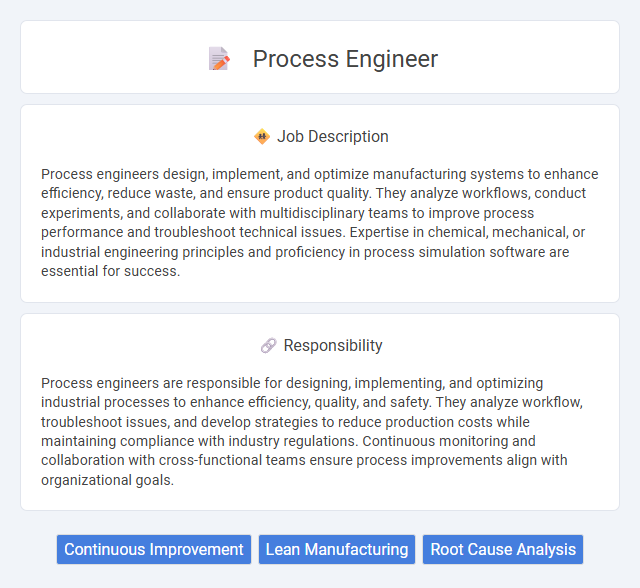
Process engineers design, implement, and optimize manufacturing systems to enhance efficiency, reduce waste, and ensure product quality. They analyze workflows, conduct experiments, and collaborate with multidisciplinary teams to improve process performance and troubleshoot technical issues. Expertise in chemical, mechanical, or industrial engineering principles and proficiency in process simulation software are essential for success.
People with strong analytical skills and a preference for structured environments are likely to thrive as process engineers. Those who enjoy troubleshooting complex systems and optimizing workflows may find the role particularly suitable. Conversely, individuals who dislike repetitive tasks or working with detailed technical data might struggle in this position.
Qualification
A Process Engineer typically requires a bachelor's degree in chemical, mechanical, or industrial engineering, with strong knowledge of process design and optimization. Proficiency in tools like CAD software, simulation programs, and data analysis is essential. Experience in manufacturing environments, problem-solving skills, and understanding of safety regulations are highly valued qualifications.
Responsibility
Process engineers are responsible for designing, implementing, and optimizing industrial processes to enhance efficiency, quality, and safety. They analyze workflow, troubleshoot issues, and develop strategies to reduce production costs while maintaining compliance with industry regulations. Continuous monitoring and collaboration with cross-functional teams ensure process improvements align with organizational goals.
Benefit
Process engineer roles likely offer significant benefits such as competitive salaries, opportunities for professional growth, and the chance to work on innovative projects. Employees may also gain expertise in optimizing systems, improving efficiency, and reducing costs, which can enhance career prospects. There is a probability that companies provide additional perks like health insurance, bonuses, and flexible work arrangements to attract and retain talent.
Challenge
Process engineer roles likely involve navigating complex challenges such as optimizing manufacturing efficiency and ensuring product quality. They probably face the need to troubleshoot process deviations and implement innovative solutions under tight time constraints. Adapting to evolving technologies and regulatory requirements might also be a regular aspect of the job's difficulty.
Career Advancement
Process engineers specializing in continuous improvement techniques and Six Sigma methodologies experience significant career advancement opportunities within manufacturing, chemical, and energy sectors. Mastery of process simulation software such as Aspen HYSYS and expertise in lean manufacturing principles enhance prospects for senior roles like Process Engineering Manager or Operations Director. Strong analytical skills combined with leadership capabilities drive promotions into strategic positions focused on optimizing production efficiency and reducing operational costs.
Key Terms
Continuous Improvement
Process engineers specializing in continuous improvement analyze existing manufacturing systems to identify inefficiencies and implement data-driven solutions that enhance productivity and quality. They utilize methodologies like Lean Six Sigma and Kaizen to reduce waste, optimize workflows, and increase operational efficiency. Their expertise in process optimization contributes to cost savings, faster production cycles, and sustained competitive advantage.
Lean Manufacturing
Process engineers specializing in Lean Manufacturing optimize production workflows by eliminating waste and enhancing efficiency, directly impacting cost reduction and product quality. They employ methodologies such as value stream mapping, 5S, and Kaizen to streamline operations and improve cycle times in manufacturing environments. Expertise in Six Sigma and continuous improvement frameworks enables process engineers to drive sustainable operational excellence across diverse industries.
Root Cause Analysis
Process engineers specializing in Root Cause Analysis systematically identify underlying issues within manufacturing or production processes to enhance efficiency and quality. Utilizing data-driven methodologies such as Fishbone Diagrams, 5 Whys, and Failure Mode and Effects Analysis (FMEA), they pinpoint process bottlenecks and implement corrective actions. Their expertise significantly reduces downtime, minimizes defects, and supports continuous process improvement initiatives within industrial operations.
 kuljobs.com
kuljobs.com